Sonnet Alternatives
This article compares 10 Sonnet alternatives. We analyze features, pricing, and performance to help you decide which tool is right for your business.

Many people use Sonnet for good reasons. It performs well in specific situations, which is why it has a dedicated user base. It gets the job done when you need a tool with its particular strengths.
But like any tool, it has limits. Some users find it can be slow or lack certain features. For this reason, we analyzed the best alternatives based on G2 reviews to help you shortlist your top options. Let's get started.
Consider 11x for Your Sales Team
For teams that want to add to their sales force, 11x offers digital workers. They are designed to manage specific sales functions. Consider how these workers could integrate with your existing process to help meet sales objectives.
At 11x, we provide a GTM platform where AI agents manage your sales process. Our AI agent Alice identifies prospects, handles outreach via email and LinkedIn, and maintains your CRM records.
Another agent, Julian, qualifies inbound leads and schedules meetings. We replace separate tools for data enrichment, outreach, and email warmup, and unify these functions into one platform.
Sonnet Alternatives
The following sections provide a detailed review of Sonnet alternatives. We cover each tool's pricing, main features, and potential advantages or drawbacks compared to Sonnet.
1) Writer
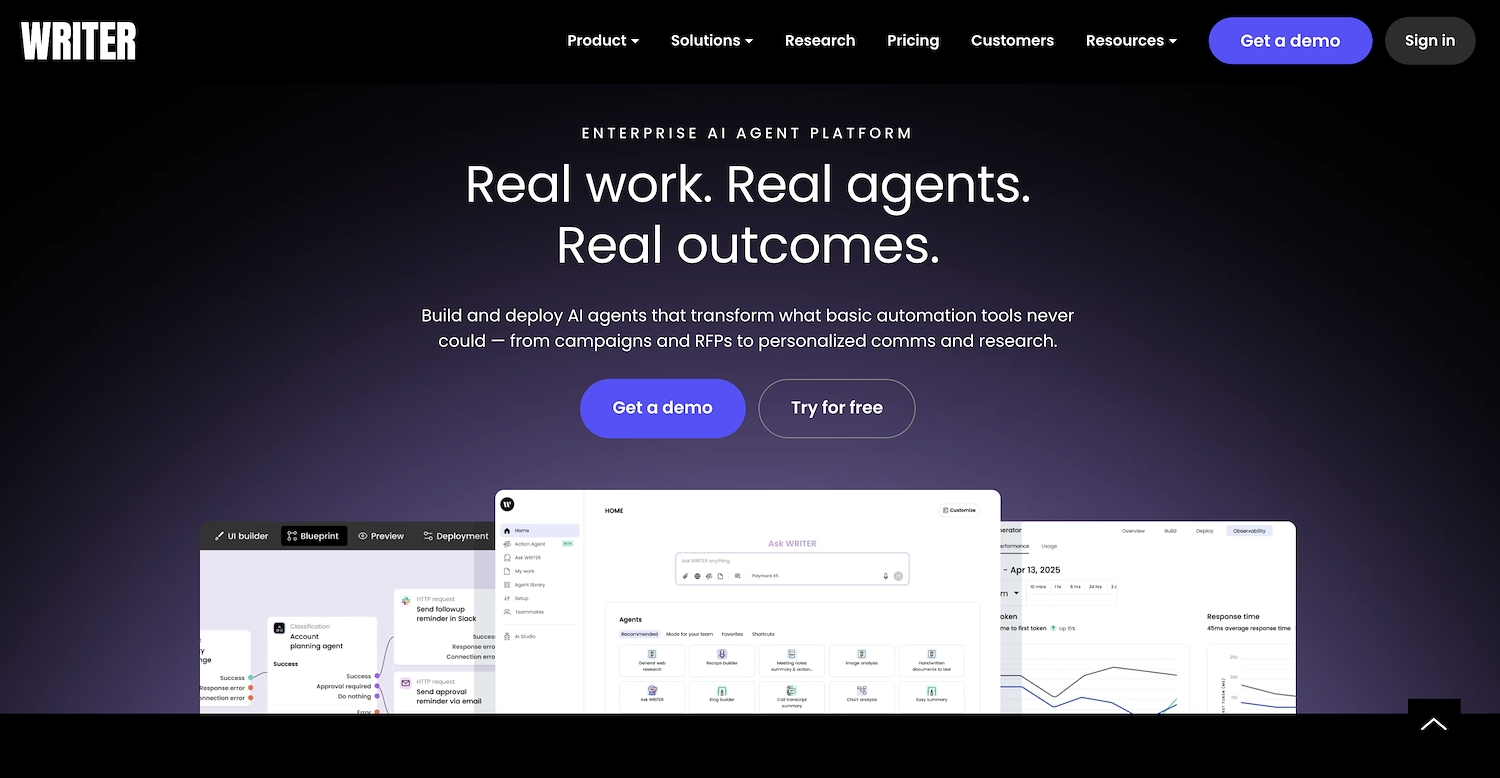
Writer is a generative AI platform for enterprises. It offers an agent builder for IT and business teams to create AI agents with its Palmyra LLMs and a Knowledge Graph. The platform connects to company data and has a focus on security and governance for large-scale use.
Use cases include agents for sales that pull CRM data and craft follow-up emails. Other agents can produce copy and images from a strategy brief.
Writer's Main Features
Provides an agent builder platform with a drag-and-drop UI, process blueprints, and shared toolkits for IT and business teams.
Utilizes Palmyra, a proprietary family of enterprise-grade LLMs that support advanced reasoning and tool calling.
Connects to proprietary data through a graph-based RAG, Knowledge Graph, which allows for no-code setup and semantic retrieval.
Offers a library of over 100 pre-built, domain-specific agents for departments like sales, marketing, and support.
How Writer Compares To Sonnet
Average Review score: 4.3/5 stars based on 86 G2 reviews.
Writer provides an agent builder to create custom AI agents for specific business functions, a feature not central to Sonnet's offering.
It connects directly to company data using a Knowledge Graph, which differs from Sonnet's approach that may require more manual data handling.
The platform uses its proprietary Palmyra LLMs, which are designed for enterprise needs, offering a different performance profile compared to Sonnet.
Writer includes a library of over 100 pre-built agents, potentially reducing setup time compared to Sonnet, where similar workflows might need to be created manually.
Potential Drawbacks Compared To Sonnet
Writer may present a learning curve for teams unfamiliar with agent builders, which can make initial setup slower compared to Sonnet's more direct interface.
Some users find its AI-generated content can be less creative. The output might require more human editing for style and nuance than content from Sonnet.
The tool's enterprise focus means it could be overly complex for smaller teams. A user who needs a straightforward writing tool might find Sonnet a better fit.
Pricing and Cost-Effectiveness
Writer offers a Starter plan at $29 per month for one user, while its Enterprise plan requires direct contact for a quote. A direct cost comparison is not possible, as Sonnet's pricing details are not provided.
2) Jasper
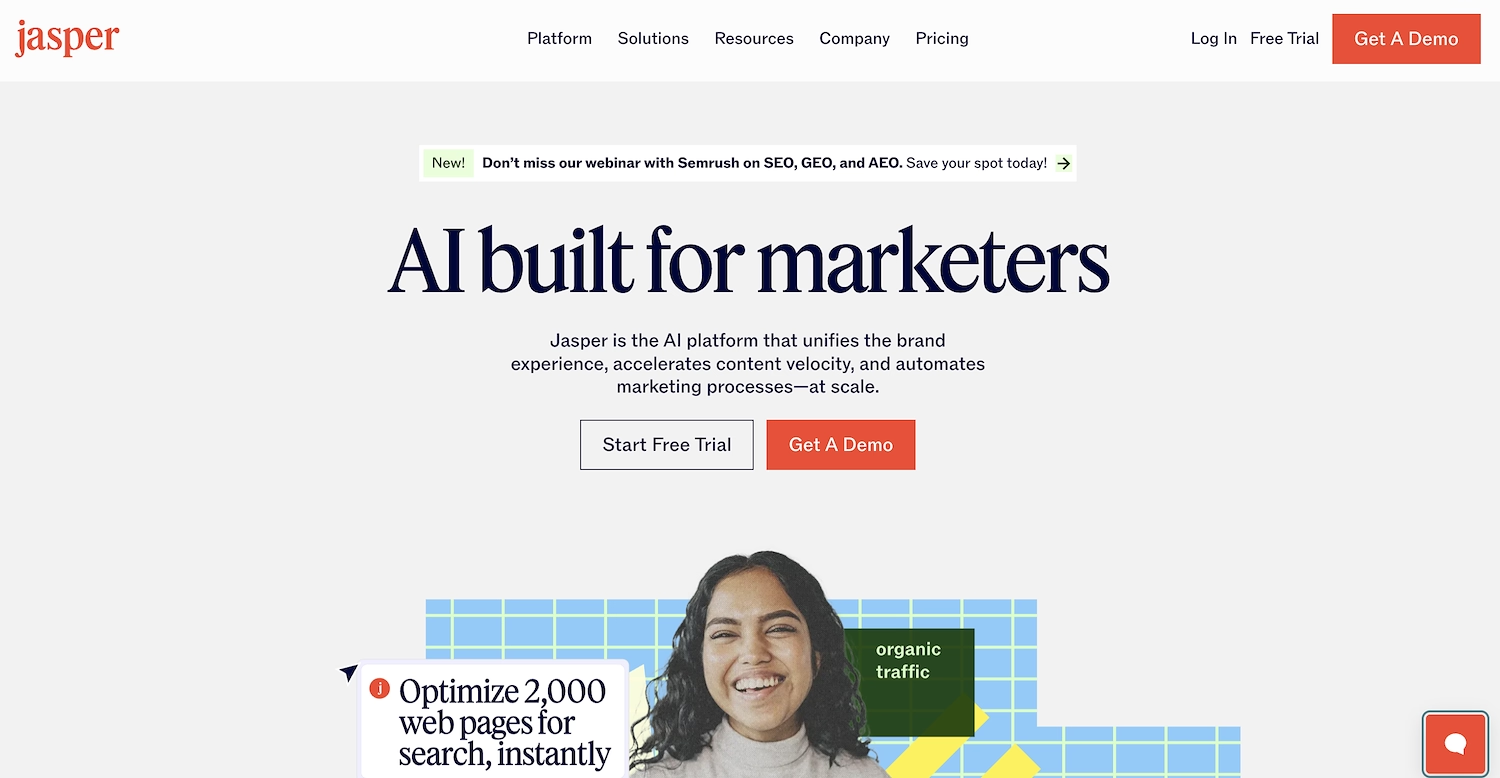
Jasper is an AI platform for marketing teams. It automates tasks and accelerates content production. The workspace uses intelligent Agents and a context layer, Jasper IQ, for brand consistency. It supports integrated campaigns, social media content, ad copy, and blog post creation.
Jasper's Main Features
Automates marketing workflows using purpose-built, autonomous agents.
Maintains brand consistency with Jasper IQ, a central context hub for brand voice, style guides, and knowledge bases.
Builds and customizes AI applications and workflows in a no-code environment called AI Studio.
Generates on-brand images using proprietary vision models within the AI Image Suite.
How Jasper Compares To Sonnet
Average Review score: 4.7/5 stars based on 1,260 G2 reviews.
Jasper supports over 30 languages for content creation and translation, offering more flexibility for global teams compared to Sonnet, which may have more limited language options.
The tool comes with over 50 skills taught by marketing experts, such as writing email subject lines. This provides more specialized marketing functions than Sonnet's general writing capabilities.
It allows team members to collaborate on documents using unique logins. This differs from Sonnet, where collaborative work might require external tools or processes.
A built-in plagiarism checker is included to verify content originality, a feature that Sonnet users may need to access through a separate service.
Potential Drawbacks Compared To Sonnet
Jasper sometimes produces content that some users find generic or requires heavy editing. In contrast, Sonnet is often noted for its ability to generate more nuanced text that needs less revision.
The tool's output may require careful fact-checking, as some users report occasional inaccuracies. This differs from Sonnet, where the output is generally considered reliable, reducing the need for extensive verification.
Its strong focus on marketing features can feel restrictive for users who need a general-purpose writing assistant. Sonnet, in comparison, often serves as a more straightforward tool for a wider range of writing tasks.
Pricing and Cost-Effectiveness
Jasper offers a Creator plan at $39 per year and a Teams plan starting at $99 per year. A direct cost comparison is not possible as Sonnet’s pricing is not publicly available. For the most current details, we recommend visiting Jasper's official website.
3) Copy.ai
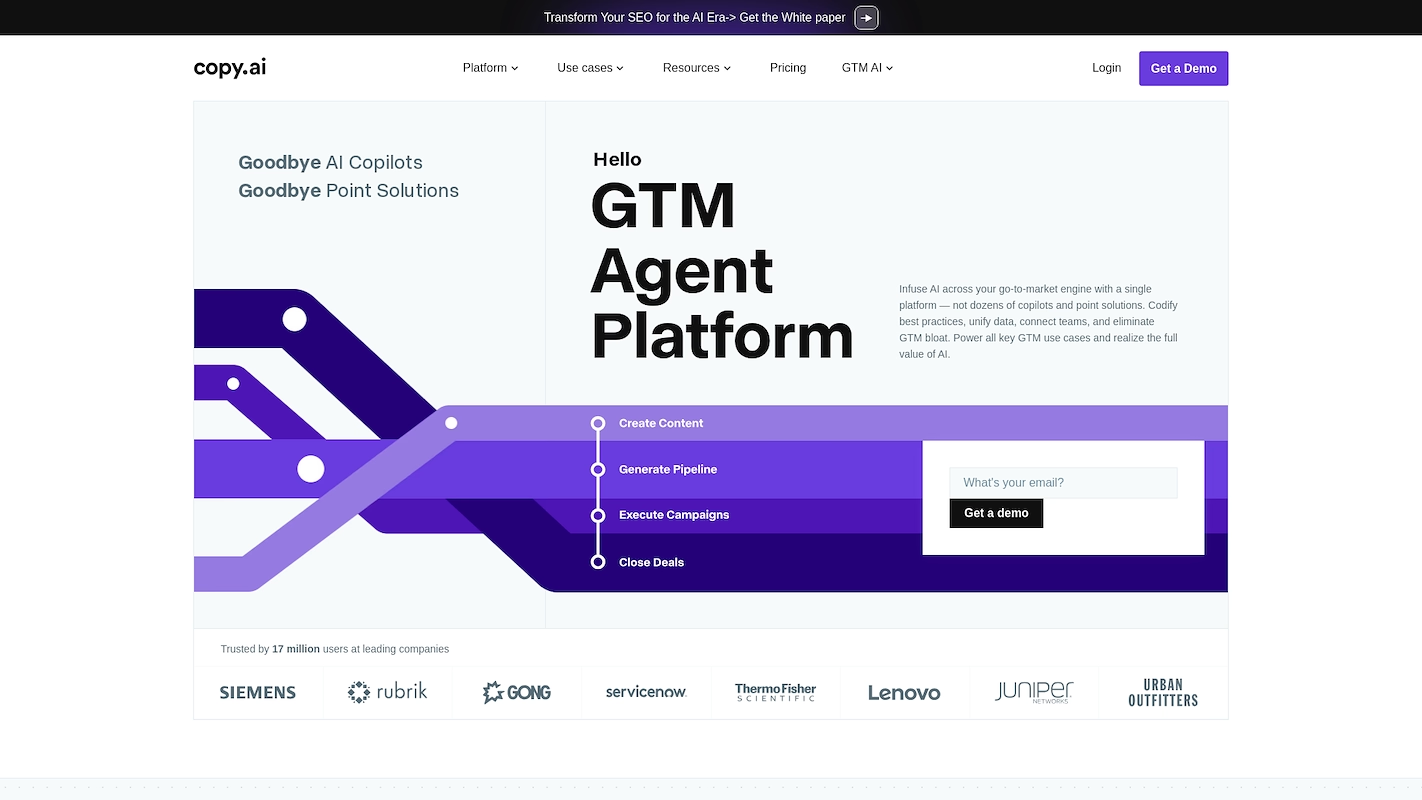
Copy.ai is a GTM Agent Platform that applies generative AI to a company's go-to-market functions. It unifies data and connects sales, marketing, and operations teams on one platform. Use cases include deep account research, personalized sales outreach, and automated content creation.
The platform also processes inbound leads and analyzes call transcripts. This analysis provides AI insights to coach deals and forecast results.
Copy.ai's Main Features
The platform is LLM-model-agnostic, supporting models from OpenAI, Anthropic, and others, and includes over 2,000 native integrations.
It uses AI-powered workflows to codify processes and deploys automated agents with decision-making capabilities for specific tasks.
A queryable data layer called Tables consolidates data sources, while an Infobase acts as a central knowledge repository for all AI outputs.
The platform includes a Brand Voice module that stores a company’s tone and style guidelines to maintain content consistency.
How Copy.ai Compares To Sonnet
Average Review score: 4.7/5 stars based on 182 G2 reviews.
Copy.ai provides go-to-market workflows to automate sales and marketing tasks. This differs from Sonnet, which focuses more on general content creation without built-in process automation.
It supports multiple LLM models from providers like OpenAI and Anthropic. This offers more flexibility compared to Sonnet, which may operate on a single, proprietary model.
The tool includes a central data layer to unify information from different sources. This approach is different from Sonnet, where data handling might be a more manual process for users.
A dedicated Brand Voice module helps keep all content consistent with company style guides. This is a more structured feature for brand alignment than what is typically available in Sonnet.
Potential Drawbacks Compared To Sonnet
Some users report that Copy.ai's output can feel generic and may require more edits. This is different from Sonnet, which often produces more nuanced text that needs fewer revisions for style.
The tool's output sometimes needs careful fact checks due to occasional inaccuracies. In comparison, Sonnet's content is generally considered reliable, which can reduce the time spent on verification.
Copy.ai's focus on go-to-market workflows can make it complex for simple content tasks. Teams that need a direct content creation tool might find Sonnet's more straightforward approach a better fit.
Pricing and Cost-Effectiveness
Copy.ai offers a free plan, a Starter plan at $49 per month, and an Advanced plan at $249 per month. A direct cost comparison with Sonnet is not possible since its pricing is not public. For the most up-to-date information, check the detailed pricing on Copy.ai's official website.
4) Anyword

Anyword is an AI platform for marketing and sales teams. The tool analyzes text to predict its performance with a target audience. It connects copy with performance metrics to guide content choices.
A specific use is the analysis of conversation recordings. This process extracts insights from sales calls to help refine scripts and team approach based on actual customer interactions.
Anyword's Main Features
Audits existing content against an industry-specific A/B-test dataset and generates scored copy variations to predict performance.
Manages brand consistency by centralizing tone, messaging, personas, and style guidelines for all outputs.
Integrates a performance prediction API to add A/B-tested data and real-time scoring into external AI applications.
Applies brand voice and prediction scoring within other applications like ChatGPT and Notion through a Chrome extension.
How Anyword Compares To Sonnet
Average Review score: 4.8/5 stars based on 1,211 G2 reviews.
Anyword predicts content performance with a score. This differs from Sonnet, which generates content without offering performance analytics.
It uses data from extensive A/B tests to guide copy creation. This provides a data-backed approach that is different from Sonnet, where users rely on their own judgment.
The tool offers audience insights to tailor messages for specific groups. This is a more targeted function compared to Sonnet's general writing help.
A built-in plagiarism checker verifies content originality. Sonnet users might need a separate tool for this function.
Potential Drawbacks Compared To Sonnet
Some users find Anyword's content can be formulaic. The output might need more human editing for a unique voice, unlike Sonnet, which often produces more nuanced writing from the start.
The tool's focus on performance metrics and A/B testing can be complex for simple writing tasks. Teams that need a direct content assistant may find Sonnet's straightforward approach a better fit for general use.
Anyword's data-driven features are reflected in its pricing, which might be high for users who do not need performance analytics. Sonnet could be a more cost-effective option for pure content generation needs.
Pricing and Cost-Effectiveness
Anyword offers a Starter plan at $39 per month, a Data-Driven plan at $79 per month, and a Business plan at $349 per month. A direct cost comparison with Sonnet is not possible since its pricing is not public. For the most up-to-date information, check the detailed pricing on Anyword's official website.
5) Writesonic
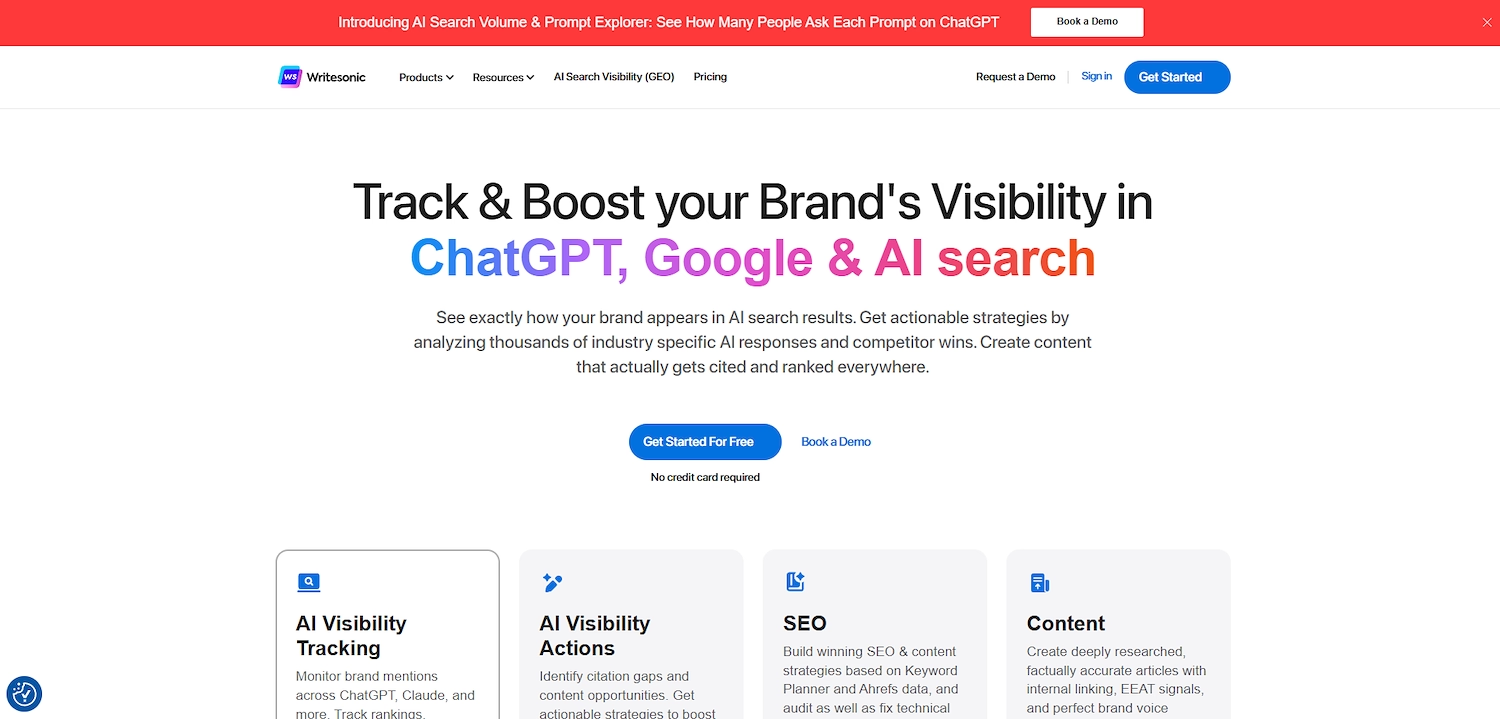
Writesonic is an AI platform that helps create content for business use. It provides tools to produce various written materials to support marketing and sales teams.
A specific function is the ability to process conversation records. This feature lets teams review customer interactions and use that data to refine their approach.
Writesonic's Main Features
Monitors brand mentions and ranking position across more than seven AI search platforms, including ChatGPT and Google AI Overviews.
Integrates Ahrefs data for keyword planning and provides automated fixes for technical SEO audits.
Generates long-form, EEAT-compliant articles that include internal links and automatic source citations.
Provides access to switch between different LLMs, including Claude 3.5 Sonnet, GPT-4o, and Gemini 1.5 Pro.
How Writesonic Compares To Sonnet
Average Review score: 4.7/5 stars based on 2,029 G2 reviews.
Writesonic provides built-in SEO functions with data from Ahrefs. This differs from Sonnet, where users often need separate tools for keyword research and analysis.
It allows users to choose from multiple large language models, like GPT-4o and Claude 3.5 Sonnet. This gives more control over the output compared to Sonnet, which likely uses a single, fixed model.
The platform offers real-time web search capabilities for creating content with current information. This is a different approach from Sonnet, which may use static data that can become outdated.
This tool monitors brand mentions across AI search platforms. This provides a specific SEO advantage not found in Sonnet's general content creation features.
Potential Drawbacks Compared To Sonnet
Some users report that Writesonic's output can feel less refined. It might need more edits for style compared to Sonnet, which is known for text that has more nuance.
The tool's wide range of SEO and marketing features can be complex for users who need a simple writing assistant. Sonnet, in contrast, provides a more direct experience for general writing tasks.
Its credit-based system can sometimes be confusing or costly for users with inconsistent needs. This differs from a tool like Sonnet, which may have a more predictable pricing structure.
Pricing and Cost-Effectiveness
Writesonic offers a free trial, a Lite plan at $49 per month, and a Standard plan at $99 per month. A direct cost comparison with Sonnet is not possible since its pricing is not public. For the most up-to-date information, check the detailed pricing on Writesonic's official website.
Add Digital Workers to Your Sales Team
If your goal is to add digital workers to your sales process, consider 11x. The platform offers AI agents to manage prospect identification, outreach, and CRM updates. This approach unifies several sales functions into a single system.
At 11x, our AI agents manage your sales playbook. Alice finds accounts, enriches data, and handles outreach, while Julian qualifies inbound leads and books meetings. We replace separate tools for data, outreach, and email warmup, unifying these functions into one platform.
Book a demo to see our platform in action.
6) Sudowrite
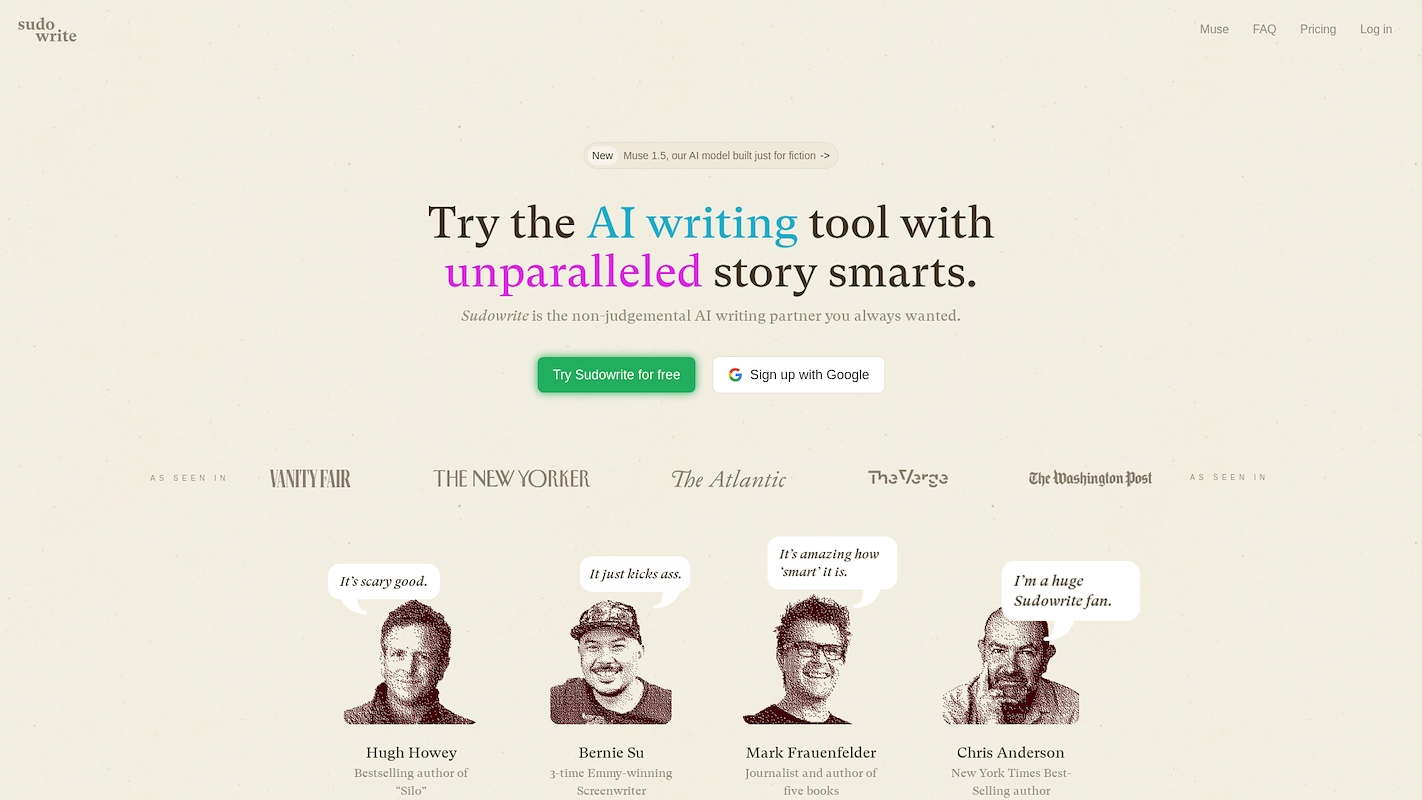
Sudowrite is an AI partner for creative work, such as fiction and screenplays. The tool provides features to help authors brainstorm ideas, rewrite passages, and expand scenes with descriptive detail.
It can generate plot points and character descriptions. The platform's focus is on narrative development and the craft of compelling stories, not on business communications.
Sudowrite's Main Features
The Story Bible feature guides users from an initial idea to a full outline and chapter beats, drafting thousands of words in the author's style.
Its Describe tool generates descriptive passages with sensory details, which helps enrich scenes without interrupting the plot's pacing.
The platform includes an AI beta reader that gives feedback on manuscripts, pinpointing actionable areas for improvement across unlimited drafts.
A visual Canvas lets users plot stories and organize character arcs, and it can suggest alternative plot points, secrets, and story twists.
How Sudowrite Compares To Sonnet
Average Review score: 5.0/5 stars based on 1 G2 review.
Sudowrite includes a Story Bible feature to organize plot and characters. This differs from Sonnet, which is designed for general business writing and lacks specialized tools for narrative structure.
It offers specific tools for creative work that generate descriptive passages or plot twists. Sonnet, in comparison, provides more general content generation without these narrative-focused functions.
The tool provides an AI beta reader that gives feedback on manuscripts. This is a specialized feature for authors that is not available in Sonnet, which focuses on content creation rather than critique.
This platform is built for fiction and screenplays. This contrasts with Sonnet's broader application for business content, which makes Sudowrite a more specialized choice for creative writers.
Potential Drawbacks Compared To Sonnet
Sudowrite's design focuses on fiction and screenplays. This makes it less practical for business tasks like report composition or email drafts, where Sonnet provides more relevant support.
The tool does not include features for marketing or sales teams. In contrast, Sonnet is better equipped for the creation of business-related content, a key difference for commercial use.
Some users note the user interface can be difficult to navigate. The panel and text sizes are sometimes too large, which may make the search for specific functions less direct compared to Sonnet's interface.
Pricing and Cost-Effectiveness
Pricing details for Sudowrite are not publicly available, making a direct cost comparison with Sonnet impossible. For the most up-to-date information, check the detailed pricing on Sudowrite's official website.
7) Rytr
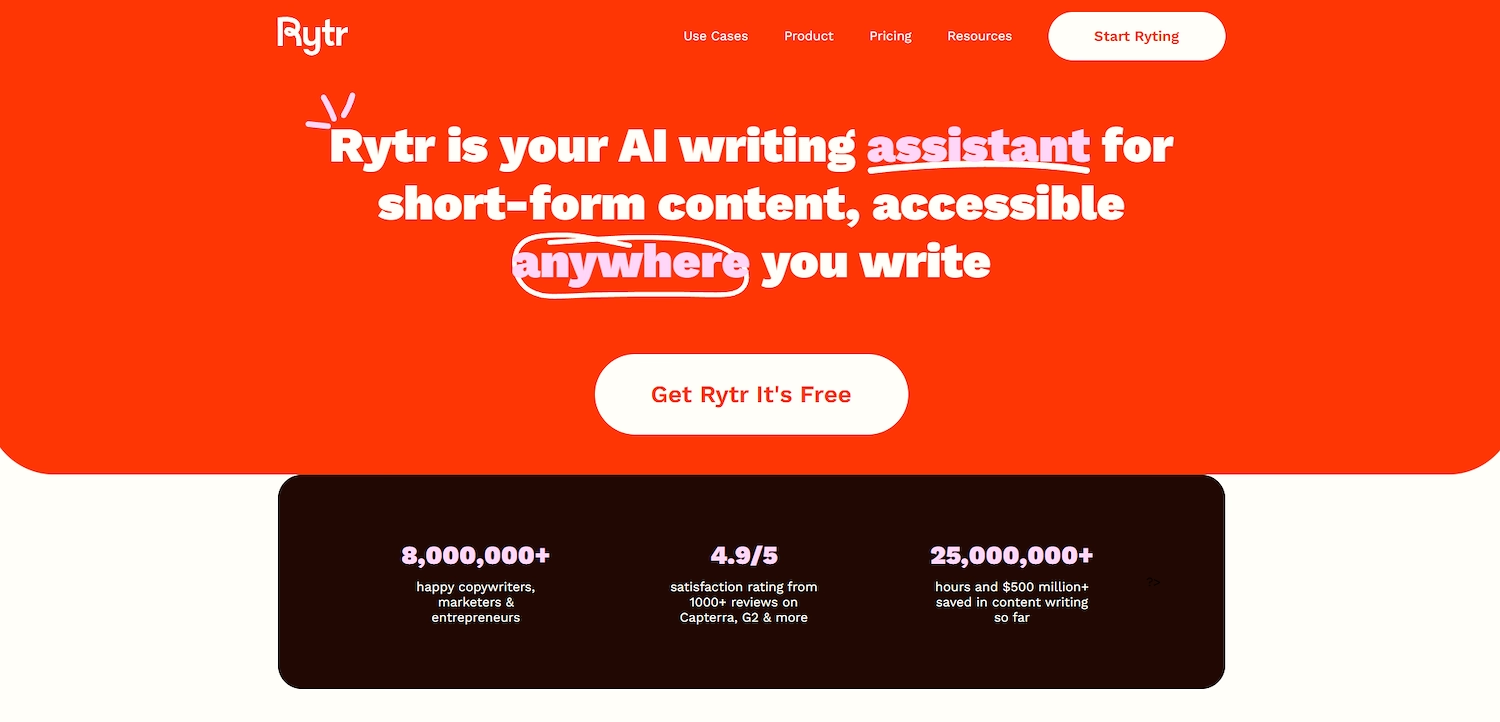
Rytr is an AI assistant that creates content for many needs. The platform provides tools to produce text in multiple formats, from emails to social media posts. For teams that review customer interactions, Rytr can process conversation recordings. This function extracts information from audio to offer insights for sales and support staff.
Rytr's Main Features
It provides over 40 built-in content templates for various use cases, including ad copy, blog sections, and SEO meta titles.
The platform includes a tone-matching function that creates custom tones from writing samples and a “My Voice” feature to store personal brand voices.
It supports over 40 languages on its premium plan and offers more than 20 preset tones across all plans.
A built-in plagiarism checker is available with a monthly credit allotment that varies by subscription plan.
How Rytr Compares To Sonnet
Average Review score: 4.7/5 stars based on 812 G2 reviews.
Rytr provides over 40 content templates for specific uses like ad copy. This offers more structure compared to Sonnet's general content generation.
It supports over 40 languages, which gives it a wider application for global teams than Sonnet, which may have fewer language options.
The tool includes a built-in plagiarism checker. This is a feature that Sonnet users might need to access through a separate service.
A "My Voice" feature lets users create and save custom tones. This provides more specific brand alignment than Sonnet's general tone adjustments.
This platform offers a free plan for users with basic needs. This makes it more accessible for initial trials compared to Sonnet, which does not publicly list a free option.
Potential Drawbacks Compared To Sonnet
Rytr's generated content sometimes lacks the nuance found in Sonnet's output. This may mean users spend more time editing the text to match a specific brand voice or style.
The tool's free and lower-tier plans have word limits and credit restrictions. This can be a constraint for users with high-volume content needs, unlike Sonnet, which may offer a more predictable structure.
Some users report that content from the platform may require careful fact-checking. This differs from Sonnet, where the output is generally seen as reliable and needs less verification.
Pricing and Cost-Effectiveness
Rytr offers a free plan, a Saver plan at $9 per month, and an Unlimited plan at $29 per month. A direct cost comparison with Sonnet is not possible since its pricing is not public. For the most up-to-date information, check the detailed pricing on Rytr's official website.
8) Hypotenuse AI
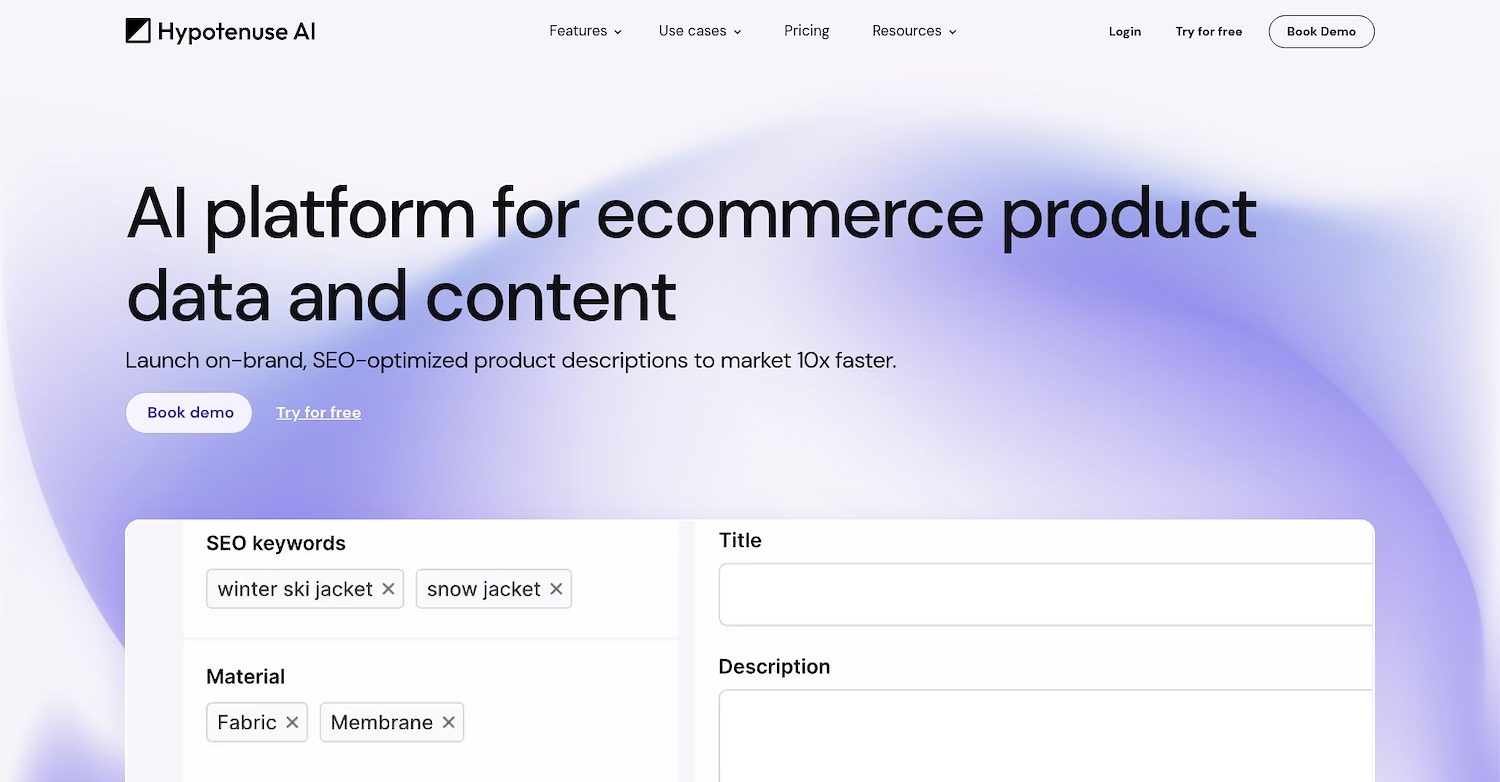
Hypotenuse AI is a platform that generates content for business needs, with tools for marketing and e-commerce.
A specific function is the analysis of conversation records. This process extracts data from customer calls to inform sales and support strategies.
Hypotenuse AI's Main Features
Offers grammar checks, tone adjustments, and sentence formatting tools.
Provides content generation and recommends ideas for new material.
Includes a plagiarism check to verify content originality.
Functions as a standalone application for content creation.
How Hypotenuse AI Compares To Sonnet
Average Review score: 4.7/5 stars based on 73 G2 reviews.
Hypotenuse AI specializes in e-commerce content, such as product descriptions. This is different from Sonnet, which serves as a more general text assistant.
It supports over 30 languages for content creation. This provides more options for global teams compared to Sonnet, which may have fewer language options.
The platform includes a built-in plagiarism checker to verify originality. This is a feature that Sonnet users may need to access through a separate tool.
This tool recommends new content ideas to help with material strategy. This function offers a slight advantage over Sonnet, where users must generate ideas manually.
Potential Drawbacks Compared To Sonnet
The output from Hypotenuse AI sometimes lacks the specific nuance that Sonnet provides. This may require users to spend extra time on edits to achieve a particular voice or style.
Its strong focus on e-commerce content can be a limitation for users who need a general writing tool. Sonnet, by comparison, offers more flexibility for various business writing needs beyond product descriptions.
Some users find the word limits on the platform's plans to be restrictive. This is different from Sonnet, which may provide a more straightforward subscription model better suited for high-volume work.
Pricing and Cost-Effectiveness
Hypotenuse AI offers an Individual plan at $29 per month and a Teams plan at $59 per month. A direct cost comparison with Sonnet is not possible since its pricing is not public. For the most up-to-date information, check the detailed pricing on Hypotenuse AI's official website.
9) QuillBot
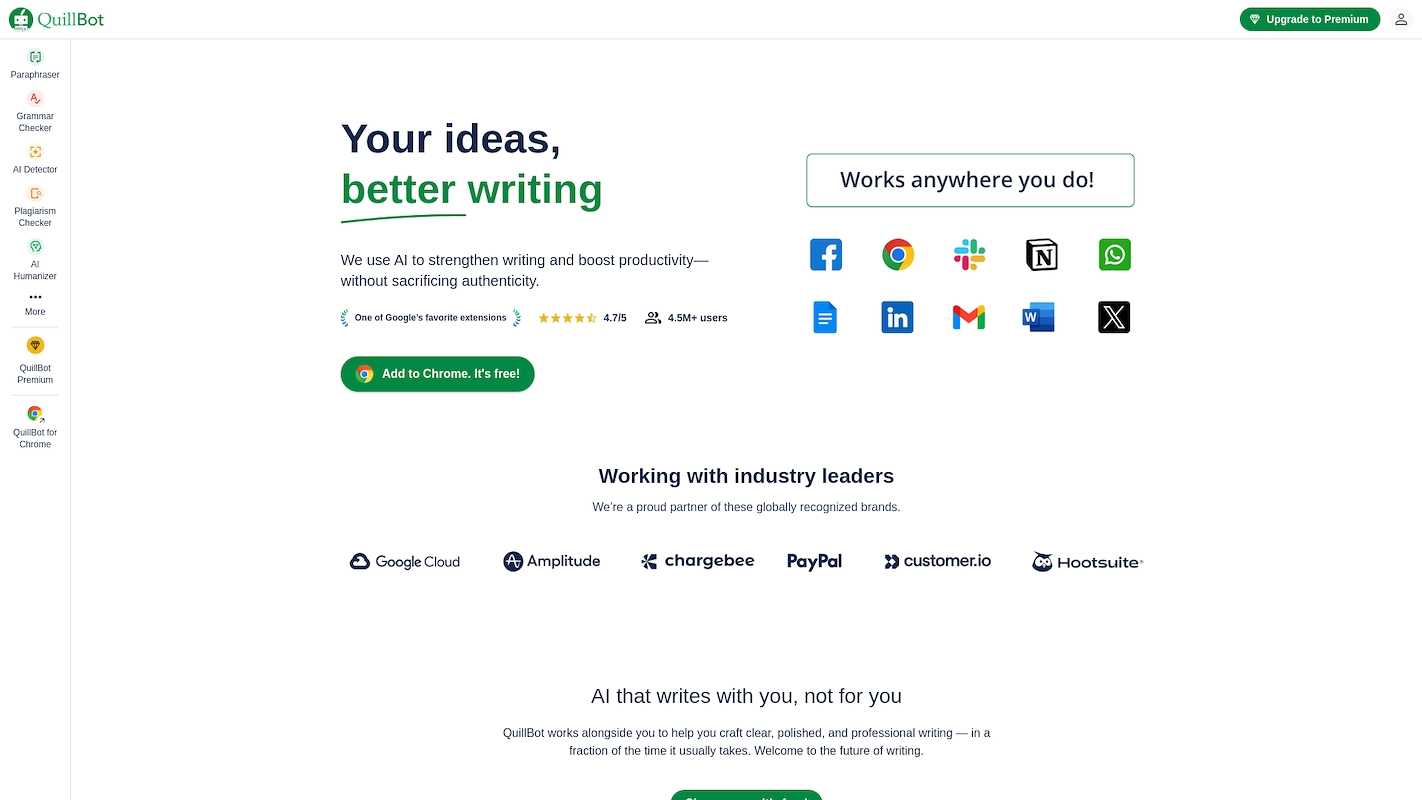
QuillBot is a writing platform with tools to paraphrase, check grammar, and summarize text. It helps users refine their writing for clarity and tone.
For teams that analyze customer interactions, the platform can process conversation records. This function extracts data from discussions to inform sales and support strategies.
QuillBot's Main Features
Offers a paraphrasing tool with multiple modes, including Standard, Fluency, Creative, and Formal.
Includes a plagiarism checker that analyzes up to 25,000 words per month.
Provides a summarizer tool to condense texts of up to 6,000 words.
Integrates with platforms like Google Chrome and Microsoft Word through a plugin.
How QuillBot Compares To Sonnet
Average Review score: 4.3/5 stars based on 35 G2 reviews.
QuillBot offers a paraphrasing tool with multiple modes, such as Formal and Creative. This provides more specific control over text rewriting compared to Sonnet's general content generation.
It integrates directly into platforms like Google Chrome and Microsoft Word. This differs from Sonnet, which functions as a standalone application and may require users to copy and paste text.
The platform includes a summarizer tool to condense long texts. This offers a way to quickly process documents, a specific function not highlighted in Sonnet's toolset.
A built-in plagiarism checker analyzes content for originality. This contrasts with Sonnet, where users might need a separate tool for the same task.
Potential Drawbacks Compared To Sonnet
QuillBot's main function is to rephrase or summarize existing text. This differs from Sonnet, which is designed to create original content from a simple prompt, making it more suitable for drafting entire articles from scratch.
The tool's paraphrased output sometimes loses the original text's specific tone. In contrast, some users find Sonnet generates content that captures a more distinct and nuanced voice from the start.
Its features are geared toward academic and individual writing tasks. This makes it less suited for creating specialized business or marketing content, a task where Sonnet may offer more direct capabilities.
Pricing and Cost-Effectiveness
QuillBot offers a free plan and a Premium plan at $9.95 per month. A direct cost comparison with Sonnet is not possible since its pricing is not public. For the most up-to-date information, check the detailed pricing on QuillBot's official website.
10) Grammarly
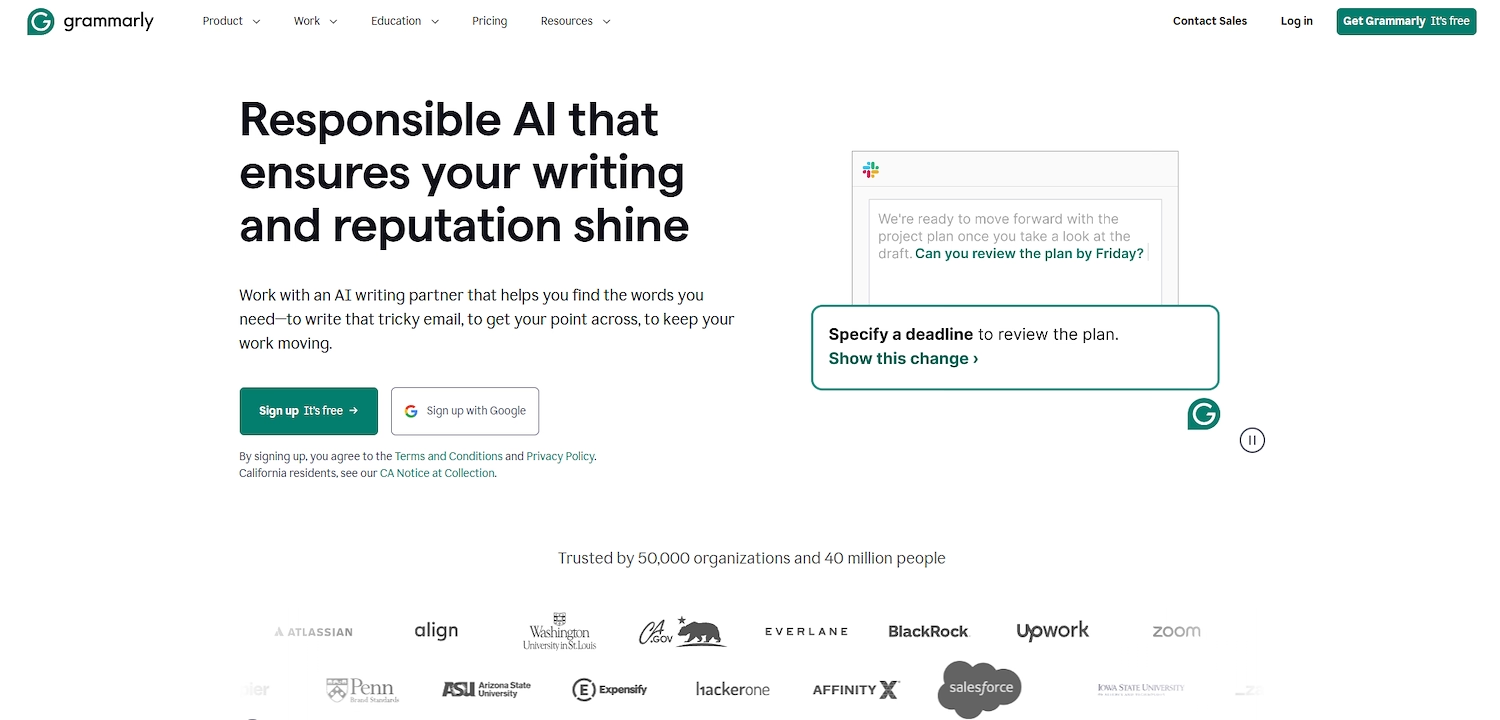
Grammarly is an AI writing assistant that refines written material. It checks for correctness and clarity. For teams that analyze customer interactions, the platform can review conversation transcripts.
This function helps ensure that reports and follow-up messages are error-free and professional. It supports clear communication for sales and support staff.
Grammarly's Main Features
Integrates with over 500,000 applications and websites through a browser plug-in and word processor support.
Offers custom style guides to help teams maintain brand consistency and share organizational knowledge.
Includes a text reader and machine translation capabilities to support different communication needs.
Provides sentence rephrasing, vocabulary recommendations, and a tone check to refine the clarity and impact of writing.
How Grammarly Compares To Sonnet
Average Review score: 4.7/5 stars based on 11,539 G2 reviews.
Grammarly offers a browser plug-in that works across more than 500,000 applications. This provides a different user experience compared to Sonnet, which functions as a separate platform.
The tool focuses on text refinement through grammar checks and sentence rephrasing. This primary function is different from Sonnet, which creates original content from user prompts.
It lets teams build custom style guides to keep writing consistent. This offers a more structured approach to brand voice than Sonnet, where style consistency depends on manual review.
The platform includes a tone check to analyze and adjust the feel of written text. This provides a specific editing function that differs from Sonnet's focus on content generation from scratch.
Potential Drawbacks Compared To Sonnet
Grammarly focuses on refining existing text and does not create original content from a prompt. This is different from Sonnet, where the main function is to generate a full draft from scratch.
The tool offers limited support for brainstorming or structuring a document. In contrast, Sonnet can generate entire article outlines, which helps with the initial creation process.
Some users might find Grammarly less suited for producing a complete article from one instruction. Sonnet is built to generate long-form content, making it a more direct tool for creating full drafts.
Pricing and Cost-Effectiveness
Grammarly offers Free, Pro, and Enterprise plans. A direct cost comparison with Sonnet is not possible since pricing for both tools is not public. For the most up-to-date information, check the detailed pricing on Grammarly's official website.
Which One Should You Go With?
Choosing a Sonnet alternative involves considering many variables specific to your team's needs. This guide offered a look at several options to help you make an informed decision.
If your focus is on improving sales functions, 11x provides AI agents to manage your go-to-market process. These agents handle tasks from prospect identification to outreach, unifying your sales tools into one platform.




